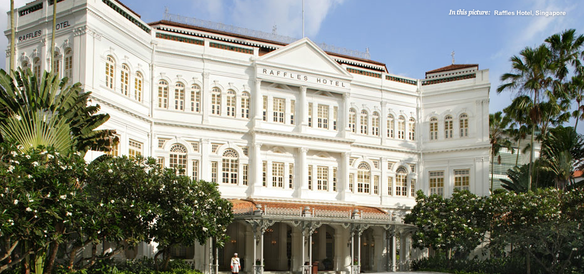Cetis eNewsletter
February 2016
FRHI Hotels & Resorts receives prestigious J.D. Power President's Award.
 Fairmont Hotel Singapore
Fairmont Hotel Singapore
TORONTO, February 3, 2016 – Cetis partner FRHI Hotels & Resorts (FRHI), the parent company of luxury brands Fairmont Hotels & Resorts, Raffles Hotels & Resorts and Swissôtel Hotels & Resorts, is pleased to announce it has received the prestigious J.D. Power President’s Award. In doing so, FRHI becomes the first and only hospitality company to ever receive the commendation.
“We are honored and delighted to be the first hospitality company in history to be recognized by J.D. Power for this award,” said Michael Glennie, president and chief operating officer, FRHI. “Our ability to emotionally connect with our guests and deliver on our service promise is what has earned us this award, and it is entirely due to the efforts of our extraordinary team of colleagues around the world. We are grateful to have such a remarkable group of professionals dedicated to earning a special place in the heart of each and every guest.”
J.D. Power is a global marketing information services company providing performance improvement, social media and customer satisfaction insights and solutions. The company’s quality and satisfaction measurements are highly regarded by corporate institutions globally and are based on responses from millions of consumers annually. The J.D. Power President’s Award is handed out on a discretionary basis to deserving companies and individuals demonstrating exemplary results in the areas of customer engagement, quality improvement, customer satisfaction and service excellence. During the 40 year history of J.D. Power, only 13 companies have previously received the President’s Award.
Click here to book a room at FRHI Hotels & Resorts property. Click here to request a quotation for Cetis hotel phones.
“We are honored and delighted to be the first hospitality company in history to be recognized by J.D. Power for this award,” said Michael Glennie, president and chief operating officer, FRHI. “Our ability to emotionally connect with our guests and deliver on our service promise is what has earned us this award, and it is entirely due to the efforts of our extraordinary team of colleagues around the world. We are grateful to have such a remarkable group of professionals dedicated to earning a special place in the heart of each and every guest.”
J.D. Power is a global marketing information services company providing performance improvement, social media and customer satisfaction insights and solutions. The company’s quality and satisfaction measurements are highly regarded by corporate institutions globally and are based on responses from millions of consumers annually. The J.D. Power President’s Award is handed out on a discretionary basis to deserving companies and individuals demonstrating exemplary results in the areas of customer engagement, quality improvement, customer satisfaction and service excellence. During the 40 year history of J.D. Power, only 13 companies have previously received the President’s Award.
Click here to book a room at FRHI Hotels & Resorts property. Click here to request a quotation for Cetis hotel phones.
The guest experience.

Contemporary, feature-rich guest room telephones continue to represent an important driver of guest satisfaction. We've been helping our hospitality industry partners ensure a positive guest experience, since 1982.
When you need to charge guest smart devices in the room via built-in USB ports, we offer the hospitality industry's only complete line of Teledex, TeleMatrix, and Scitec brand analog and VoIP hotel phones, designed and engineered to meet your requirements.
Click here to initiate a discussion about your next renovation or new construction project, and how we help you ensure a positive guest experience throughout your properties.
When you need to charge guest smart devices in the room via built-in USB ports, we offer the hospitality industry's only complete line of Teledex, TeleMatrix, and Scitec brand analog and VoIP hotel phones, designed and engineered to meet your requirements.
Click here to initiate a discussion about your next renovation or new construction project, and how we help you ensure a positive guest experience throughout your properties.
New! Life Series Blog
Following are Chapters 1-3 of our new Life Series blog, highlighting the life story of Dr. Bing N. Sun, Cetis Founder & CEO. Click here to visit our Blog page and read the entire series.
Life Series.
Welcome to Life Series. Following is Chapter 1 in our new Life Series blog, which explores the life story of Cetis Founder & CEO, Dr. Bing N. Sun.
Chapter 1: Life is hard.

Q: You grew up in rural China in the 1970s?
A: Yes. My father was a farmer, who grew mostly rice. He never went to school and could not write his name, but neither could my mother, which was common for that time. My family was probably the poorest family in the village. I had two brothers and two sisters. I am the second child. My brothers and sisters all worked in a coop, but we often owed the coop money since we had a big family. We had no electricity and were really totally disconnected from the world. I had no idea about life outside the village at that time.
Q: Did your father expect you to follow in his footsteps?
A: No. In fact, my father once told me "Son, if you don’t study hard, you will not have enough food to eat." I remember not having enough food to eat every day. In those days, my family normally had enough food for 9 months, but not the rest of the year, so we had to look for anything else we could find for the other 3 months. Because life was hard, there were really no expectations for a career at that time. The best I could hope to do would be to leave the village and find work, where entry level salaries were about 18RMB ($3) per month outside the village. I was doing well in my early adulthood to earn 3RMB ($0.5) a month.
A: Yes. My father was a farmer, who grew mostly rice. He never went to school and could not write his name, but neither could my mother, which was common for that time. My family was probably the poorest family in the village. I had two brothers and two sisters. I am the second child. My brothers and sisters all worked in a coop, but we often owed the coop money since we had a big family. We had no electricity and were really totally disconnected from the world. I had no idea about life outside the village at that time.
Q: Did your father expect you to follow in his footsteps?
A: No. In fact, my father once told me "Son, if you don’t study hard, you will not have enough food to eat." I remember not having enough food to eat every day. In those days, my family normally had enough food for 9 months, but not the rest of the year, so we had to look for anything else we could find for the other 3 months. Because life was hard, there were really no expectations for a career at that time. The best I could hope to do would be to leave the village and find work, where entry level salaries were about 18RMB ($3) per month outside the village. I was doing well in my early adulthood to earn 3RMB ($0.5) a month.
Life Series.
Welcome to Life Series. Following is Chapter 2 in our new Life Series blog, which explores the life story of Cetis Founder & CEO, Dr. Bing N. Sun.
Chapter 2: Early education.

Q: Given your difficult living conditions, how were you able to go to school and learn?
A: Living conditions were difficult, but even worse, my father told me years later that I didn’t begin speaking until 3 years old and that people in the village told him that I must have a defect. But my father said to them, "Look at his eyes, they are very clear. He’s smart, look at his eyes!"
Q: Life proved your father to be right, but what was your early childhood education like in a rural school system?
A: School was organized by village. The teachers were not professionally trained, so I really had to learn on my own. I can still vividly remember my first day at school. I was 4 years old, and could not write my name. This infuriated my teacher, who burned my books in front of the entire class. He told the class that I had no ability to learn and should go home.
Q: That must have been very embarrassing for you, particularly at such a young age. How did you react to the teacher's words and the book burning?
A: My goal was to prove the teacher wrong, and I did, because I soon began to prove my abilities in math and was consistently scoring 100%. I would arrive at school early in morning and wait for the doors to open. I enjoyed school, so was always there first. Because I would be expected to work with my father in the rice fields, I also disciplined myself to study at night. We had no electricity, but I learned to use an oil lamp or candle between me and my book to read. In the wintertime it was particularly difficult to study, because much of the time we had no heat, but I was determined to persevere through the cold and life's challenges to succeed.
A: Living conditions were difficult, but even worse, my father told me years later that I didn’t begin speaking until 3 years old and that people in the village told him that I must have a defect. But my father said to them, "Look at his eyes, they are very clear. He’s smart, look at his eyes!"
Q: Life proved your father to be right, but what was your early childhood education like in a rural school system?
A: School was organized by village. The teachers were not professionally trained, so I really had to learn on my own. I can still vividly remember my first day at school. I was 4 years old, and could not write my name. This infuriated my teacher, who burned my books in front of the entire class. He told the class that I had no ability to learn and should go home.
Q: That must have been very embarrassing for you, particularly at such a young age. How did you react to the teacher's words and the book burning?
A: My goal was to prove the teacher wrong, and I did, because I soon began to prove my abilities in math and was consistently scoring 100%. I would arrive at school early in morning and wait for the doors to open. I enjoyed school, so was always there first. Because I would be expected to work with my father in the rice fields, I also disciplined myself to study at night. We had no electricity, but I learned to use an oil lamp or candle between me and my book to read. In the wintertime it was particularly difficult to study, because much of the time we had no heat, but I was determined to persevere through the cold and life's challenges to succeed.
Life Series.
Welcome to Life Series. Following is Chapter 3 in our new Life Series blog, which explores the life story of Cetis Founder & CEO, Dr. Bing N. Sun.
Chapter 3: Early ambitions.

Q: As you progressed through school, what did you want to do when you grew up?
A: I had no idea other than to study hard and leave the village. I had no knowledge about the outside world, but knew that life in the village was very hard, and that I wanted to change my life, and not follow in my father’s footsteps. I didn’t want to be hungry all my life.
Q: After a difficult beginning in grade school with the teacher burning your books, how did you progress with your education?
A: Because I attended middle school and high school during Cultural Revolution, most of my teachers were former university professors that the government had sent to the countryside. They actually became my teachers, which really changed my life, since I was then able to learn from some of the best Math and Physics teachers in China.
Q: So, in effect, you were still attending the village schools, but learning at a university level?
A: Yes. In fact, if it were not for the Cultural Revolution, I would have never received such high-level instruction. My teachers gave me very challenging textbooks, so by the time that I graduated from high school, I had already completed university-level studies.
Q: No doubt your teachers observed that you were a highly disciplined student, but did they discern that you were gifted?
A: Yes. My Math teacher saw promise in me. He told my father that I needed to stop working in the fields, so I could focus on my studies and improve my Math skills. In high school my Physics teacher called meDoctor, since I was so good in Physics, and really learning at a university level. He was kidding, and said it in fun, but it helped encourage me to continue to pursue higher education.
A: I had no idea other than to study hard and leave the village. I had no knowledge about the outside world, but knew that life in the village was very hard, and that I wanted to change my life, and not follow in my father’s footsteps. I didn’t want to be hungry all my life.
Q: After a difficult beginning in grade school with the teacher burning your books, how did you progress with your education?
A: Because I attended middle school and high school during Cultural Revolution, most of my teachers were former university professors that the government had sent to the countryside. They actually became my teachers, which really changed my life, since I was then able to learn from some of the best Math and Physics teachers in China.
Q: So, in effect, you were still attending the village schools, but learning at a university level?
A: Yes. In fact, if it were not for the Cultural Revolution, I would have never received such high-level instruction. My teachers gave me very challenging textbooks, so by the time that I graduated from high school, I had already completed university-level studies.
Q: No doubt your teachers observed that you were a highly disciplined student, but did they discern that you were gifted?
A: Yes. My Math teacher saw promise in me. He told my father that I needed to stop working in the fields, so I could focus on my studies and improve my Math skills. In high school my Physics teacher called meDoctor, since I was so good in Physics, and really learning at a university level. He was kidding, and said it in fun, but it helped encourage me to continue to pursue higher education.
Hotel-Online News
Tourism Tidbits: Some Principal Issues Facing the Travel Industry; Part 1 of 2.
Be creative, smile and remember that tourism is all about turning challenges into new and exciting opportunities.

by Dr. Peter Tarlow - Scholars of tourism know that the travel and tourism industry are far from static. New challenges seem to arise as quickly as mushrooms sprout up after a warm rain. Despite the constant changes, however, there have been a number of issues that have become constant problems for the industry and with which it has had to learn to live. Here are some of these issues and a few suggestions on how to begin to handle them. The recent stock market ups and downs are a real indication of the turbulence that may impact tourism in 2016 and present new challenges to tourism professionals around the world.
High Taxation on the Tourism Industry. There is a mistaken belief that visitors and tourists do not pay taxes. Nothing could be further from the truth. Instead tourists are some of the highest taxed and under represented people in the world. We only have to examine am airline ticket, rent a car, or stay at a hotel to realize how much we spend on travel. These taxes not only add a great deal to the cost of travel, but they also have become nuisances. For example, leaving too many places requires and exit payment and in all too many other locations visas is nothing more than an additional way to victimize tourists. Because tourists are generally not citizens of the places that they are visiting, they have no political voice. However, the local members of the tourism industry can act as their voice. Tourism, just as any other product has an economic saturation limit and if taxes become overly burdensome local tourism business will see a diminution in their profits.
Increase of mass tourism resulting in straining the tourism infrastructure. Many places around the world have seen large numbers of tourist arrivals but are simply not prepared to handle the influx. Tourism is much more than merely selling or marketing. There has to be a product and the product must be composed not only of the attraction and or activity but also the personnel who deliver the product. This means that if the number of visitors is greater than the capacity of a location to absorb these visitors, the locale will suffer numerous problems. Often too many visitors to a place that is ill prepared for non-sustainable numbers creates a sense of tourism euphoria in the short run, but introduces long term tourism problems that may become deadly to the sustained health of a tourism industry. An easy check on if a particular tourism product’s infrastructure is over extended is to determine the percentage of visitors wish to return. If few visitors desire to return, then this may be an indication that the price-tourism structure continuum is reaching unsustainable limits.
Physical plants that are no longer adept for modern tourism. Perhaps the biggest problem exists in the realm of airports. Many airports are simply not equipped to handle a large number of passengers arriving at the same time. This lack of infrastructure combined with often poorly trained personnel (or personnel who simply do not care) creates long lines and unpleasant memories. Tourism officials need to remember that first and last impressions are key components in their marketing efforts. Click here to read the rest of the article at Hotel-Online.
High Taxation on the Tourism Industry. There is a mistaken belief that visitors and tourists do not pay taxes. Nothing could be further from the truth. Instead tourists are some of the highest taxed and under represented people in the world. We only have to examine am airline ticket, rent a car, or stay at a hotel to realize how much we spend on travel. These taxes not only add a great deal to the cost of travel, but they also have become nuisances. For example, leaving too many places requires and exit payment and in all too many other locations visas is nothing more than an additional way to victimize tourists. Because tourists are generally not citizens of the places that they are visiting, they have no political voice. However, the local members of the tourism industry can act as their voice. Tourism, just as any other product has an economic saturation limit and if taxes become overly burdensome local tourism business will see a diminution in their profits.
Increase of mass tourism resulting in straining the tourism infrastructure. Many places around the world have seen large numbers of tourist arrivals but are simply not prepared to handle the influx. Tourism is much more than merely selling or marketing. There has to be a product and the product must be composed not only of the attraction and or activity but also the personnel who deliver the product. This means that if the number of visitors is greater than the capacity of a location to absorb these visitors, the locale will suffer numerous problems. Often too many visitors to a place that is ill prepared for non-sustainable numbers creates a sense of tourism euphoria in the short run, but introduces long term tourism problems that may become deadly to the sustained health of a tourism industry. An easy check on if a particular tourism product’s infrastructure is over extended is to determine the percentage of visitors wish to return. If few visitors desire to return, then this may be an indication that the price-tourism structure continuum is reaching unsustainable limits.
Physical plants that are no longer adept for modern tourism. Perhaps the biggest problem exists in the realm of airports. Many airports are simply not equipped to handle a large number of passengers arriving at the same time. This lack of infrastructure combined with often poorly trained personnel (or personnel who simply do not care) creates long lines and unpleasant memories. Tourism officials need to remember that first and last impressions are key components in their marketing efforts. Click here to read the rest of the article at Hotel-Online.
Visit with us on LiveChat!

Did you know that you can receive online assistance with product, pricing, support of Cetis hotel phones? The Cetis Account Manager team is here to help you with any hotel phone-related questions that you may have – before, during, or after your purchase. You may find the LiveChat feature on the lower right side of our Cetis, Teledex, TeleMatrix, and Scitec websites. We look forward to chatting with you!
